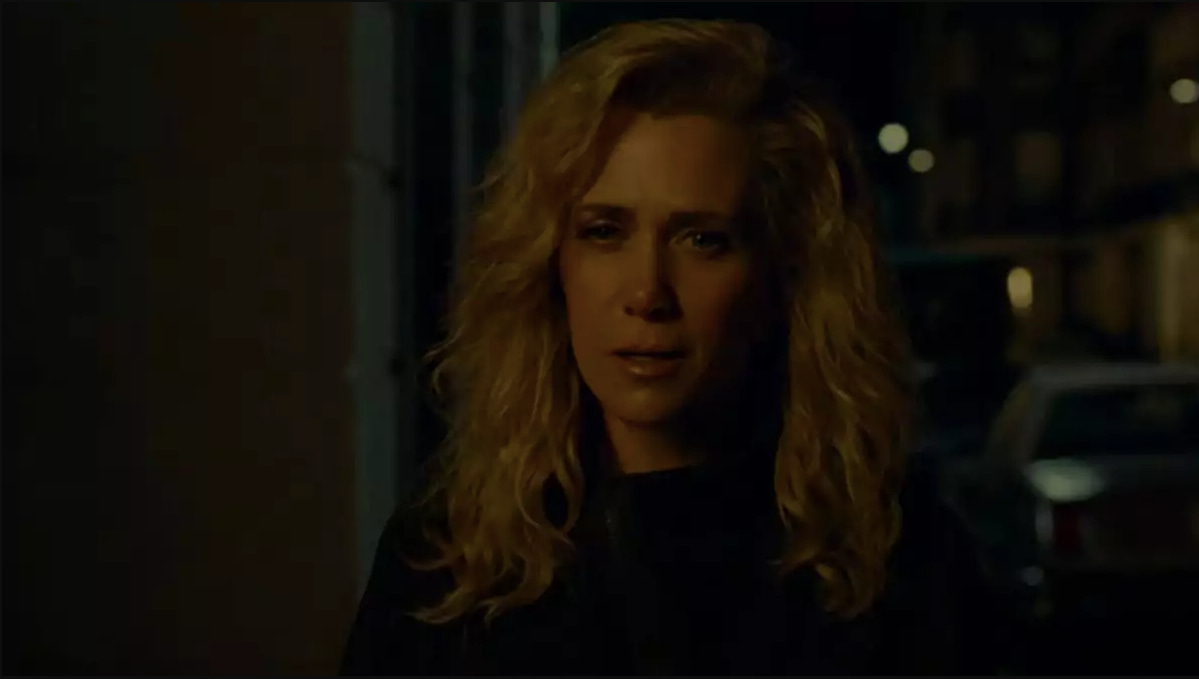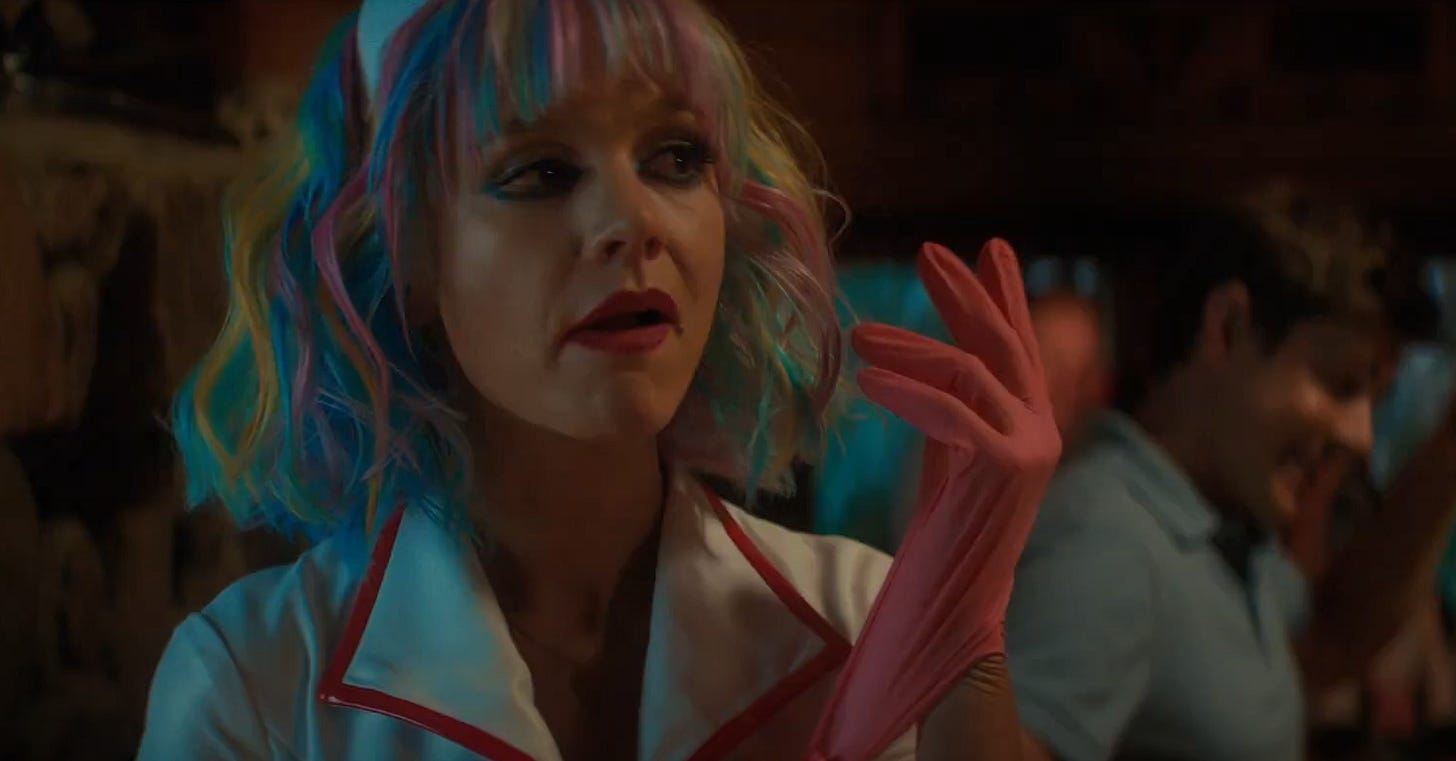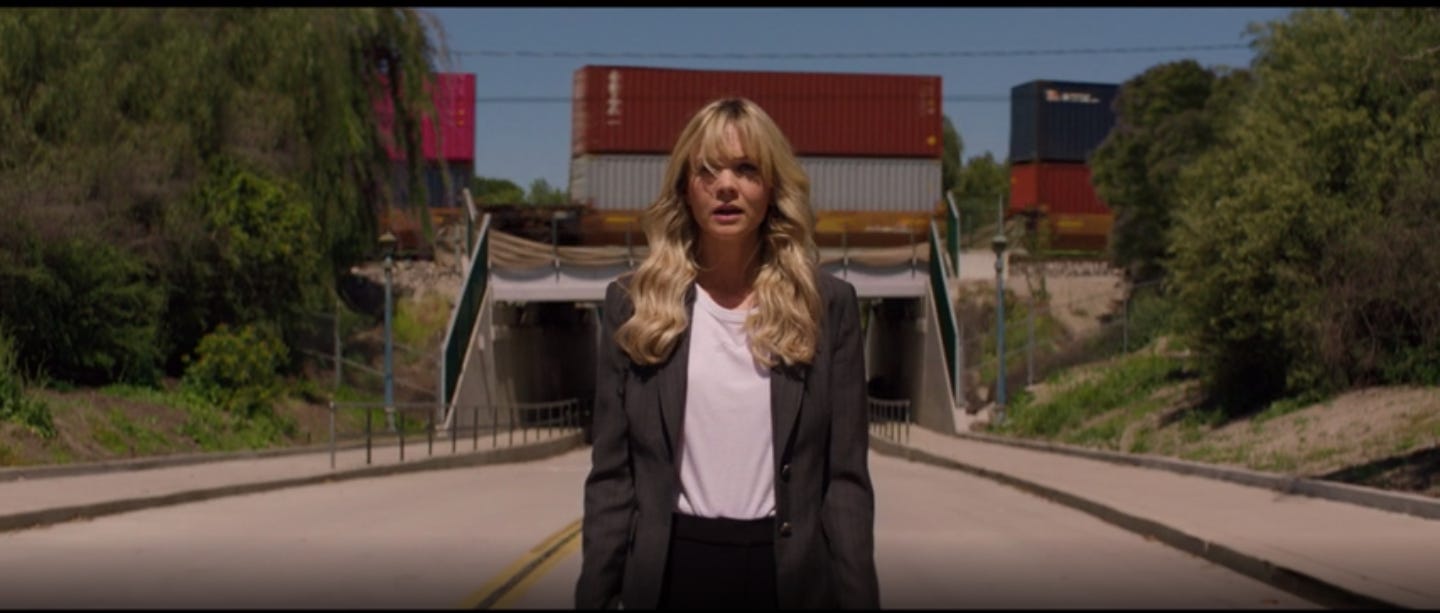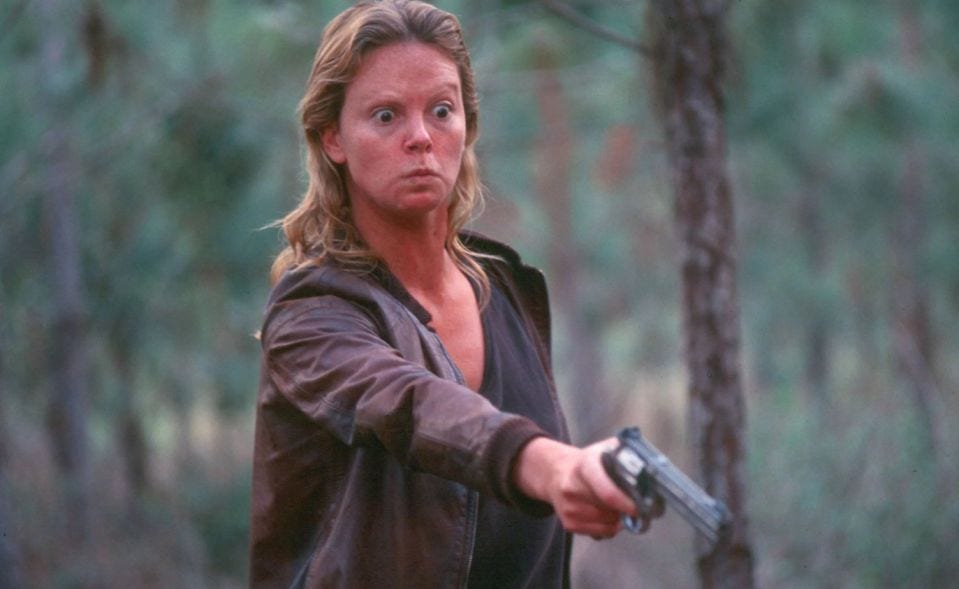Note: This newsletter discusses the ending of Promising Young Woman. The movie is still new, so if you want to avoid those spoilers, either skip this newsletter, or stop reading it after the paragraph that ends “you can begin to ask why most women don’t.”
There’s one good scene in Wonder Woman 1984, and no-one involved in the movie seems to have known which one it was. In this scene, Barbara (Kristen Wiig, almost distressingly hot in this role) is walking home late at night. She’s accosted by a man who tried to sexually assault her during a previous late-night walk. In that earlier scene, Barbara was rescued by Wonder Woman. In this scene, she has superpowers. The rapist doesn’t know she has superpowers. He also doesn’t know that he’s about to get his face kicked into an assortment of pottery shards right there on the sidewalk, but then, that’s the fun.

Barbara looks her would-be rapist straight in the eye, and says the word: “No.” She says it again, slightly louder, reveling in her ability to say it: “No.” Then she throws the fucker into the side of a van. It folds. He bounces. When he comes down, she just keeps kicking him — clearly much stronger than he is, and clearly not holding back. She’s filmed from below, against a black sky, a vengeful god emerging from the void. Ominous music swells on the soundtrack. This rapist is gonna die, and she’s gonna be the one to kill him, and she is having the time of her life.
Oh, right, I thought, at this juncture. Patty Jenkins directed the Aileen Wuornos biopic, didn’t she?
She did. What I should have remembered is that she was not all that sympathetic to Wuornos. The next time we see Barbara, she’s the movie’s villain, and Wonder Woman is gently weeping lines like “look at yourself! you’re harming innocent men!” in her direction, while telling her that she’s lost her softness and femininity in the quest for power. In fact, Barbara “can’t handle” power, and should never have pursued it — a woman who can handle power, evidently, would use it only in ways that men liked.

I assume the villain is defeated, and Barbara learns that she should have stayed powerless and gotten raped in dark alleys for the rest of her life. I don’t know. I switched it off. I have better things to do than finish a movie where women are told that getting angry about rape is wrong.
Promising Young Woman, the much-hyped rape-revenge movie from Emerald Fennell, is remarkable for one key reason: It never, ever tries to tone down its heroine’s rage. The movie centers on Cassie, a woman who has dedicated herself to avenging a gang rape that destroyed her best friend’s life. In between hunting down her friend’s rapists, Cassie has a side hustle where she tricks “nice guy” rapists into taking her home and terrorizes them. Her entire life is built around rage — all-consuming, soul-devouring, black and bitter rage. She has been angry for so long that the anger has become her whole personality.
We’ve seen movies built around male rage before. Sometimes it’s reactionary white rage: Falling Down, or Fight Club, or whatever this thing with Bob Odenkirk is. Sometimes it’s just a reliable force driving and defining the genre: Action movies, gangster movies, comic-book movies. The rape-revenge genre originally centered male rage, too; in movies like Straw Dogs or Death Wish, the hero was not the rape victim, but the victim’s husband or father. The movie would focus on his righteous quest to punish the rapists for, essentially, stealing his property. Male rage feels relatable and compelling. It’s a tool men are encouraged to own and use; it’s how they establish their dominance. Audiences understand that a man could be affronted to the point that he’d need to hurt the people who’ve hurt him.

But if rage is a core feature of masculinity, then women are not supposed to have it. Lady Macbeth has to pray to the gods to “unsex her” before she commits violence; Wonder Woman’s very eighties mewl that anger will deprive a woman of her softness and warmth and kittenish vulnerability goes back to a long tradition of arguments that expressing anger or seeking power will somehow de-gender cis women and turn them into men, or just genderless freaks of nature. Now, turning into a genderless freak of nature sounds like a bonus to me, but for women, it’s supposed to scare them back into line with fears of growing monstrous. An angry woman is a gender failure.
“Female rage” became a trendy topic a few years back, with books by Soraya Chemaly and Rebecca Traister and Brittney Cooper and Lilly Dancyger. In the past year or so, Hollywood has tried to bring ragewave to the screen. Yet filmmakers still seem uncomfortable with the idea, probably because it conflicts with the demand for female characters to be “likable” or “relatable” or at least legibly feminine. Wonder Woman 1984 toys with female rage, but only to call it misguided and selfish. The Craft: Legacy understands that everyone’s favorite witch from the original Craft was Nancy — Fairuza Balk’s performance being one of my generation’s most thrilling examples of raw female anger — but it doesn’t trust the audience to know what’s good for them. Nancy threw a rapist out of a window, but her descendants give away their magical powers on the off chance that using them might have hurt a boy.
It’s notable that WW1984 and The Craft: Legacy were both directed by women, and that Jenkins’ first Wonder Woman was received, at the time, as a feminist triumph. (I fucking loved it.) It suggests that the problem goes deeper than men being afraid of angry women. Women are also scared of themselves.
Women are supposed to be nice, to be gentle, to be nurturing, to be submissive, to be empathetic. Feminists rightfully bridle at these expectations, pointing out that the other side of the world is supposed to be aggressive and dominant and unemotional, and that “niceness” therefore comprises a list of job qualifications to be a doormat. Yet even feminist women often expect themselves to be more mature than men, or more rational than men, or more moral. A lot of conflict in feminist spaces comes down to the fact that women have higher expectations of each other than they’ve ever had of dudes.
Rage isn’t gentle or nurturing, but it is also not moral or reasonable. It can feel bigger than you are. It can take you places you’re not ready to go. Rage doesn’t have a political analysis. It doesn’t want a win-win or a better world. Rage just wants the people who are hurting you to stop. If you need your characters to seem pure and noble, or if you want to teach the women in your audience how to behave, it can only ever be a liability.
To do rage justice, you need to understand why people like watching it. There is a reason why we’re so electrified by the sight of Kirsten Wiig kicking a rapist half to death, or Fairuza Balk cackling and breaking a different rapist’s neck. Both women are clearly out of control, “unhinged” and “crazy” in all the ways women are taught to dread being, but they are also both radiant with excitement and pleasure, smiling and laughing the whole way through the scene. The dirtiest secret of rage is that it lives next door to joy.
The greatness of Promising Young Woman lies in how unsanitary Cassie’s rage is. She isn’t noble, or admirable, or cute; she isn’t presenting a term paper on rape culture. She’s mad as hell and she’s not going to take it any more. Cassie does things that are deeply scary. She does things that are staggeringly cruel.
Nor is Promising Young Woman “feminist” in any soft or sisterly sense of the term. When women are implicated in her friend’s rape — the college dean who refused to punish the rapists, or the self-described “good girl” who blames the victim for drinking — Cassie is just as vicious to them as she is to the men, if not more so. The victim-blaming tradwife, played to smug perfection by Alison Brie, might be one of the movie’s most repugnant characters. Her coy, giggling complicity invokes a lifetime of Phyllis Schlaflys and Elizabeth Bruenigs and Amy Coney Barrets, reminding you that sometimes, it really is worse when it comes from a woman.

Cassie’s revenge on the tradwife is probably the movie’s cruelest; for me, at least, it was nasty enough to make me question my own anger. Yet Fennell is brave enough to let her audience work out their own moral judgments, and let Cassie be Cassie. Fennell never tries to make her lead seem like a nice woman, and Promising Young Woman never implies that Cassie’s problems arise from not being nice enough. Her rage isn’t always likable, but it’s always framed as an understandable response to her trauma.
This is true even when Cassie’s rage takes the form of, say, smashing a dude’s windshield with a tire iron because he called her a cunt. This scene is practically a love letter to the restorative powers of anger. As Cassie gets out of her car and grabs the tire iron, Tristan und Isolde swells on the soundtrack. The sappy classical strings unfold to their famously orgasmic climax as she brings the weapon down inches from the guy’s face, over and over and over again. In the end, as he drives away terrified, she’s panting and shaking, drained but satisfied. The scene just could not be clearer: This. Feels. Good.

The scene does nothing to advance the plot. The guy isn’t connected to Cassie’s mission in any way. Yet every woman on earth has probably wanted to do something like that to a guy who called her a “cunt” or a “bitch” on the street. The scene exists solely to give female audience members an outlet: Here’s what it would look like if you gave that asshole what he deserves. Here’s how happy you would be.
Rage can be a release. Rage can be fun. When you have every reason to be angry, and a lifetime of cultural injunctions forcing you to swallow and repress your anger, letting it out can feel absolutely amazing. It’s only when we’re brave enough to admit the pleasure of rage that we can dig deeper. Once you acknowledge that every woman on earth has probably wanted to flip out at some dude, you can begin to ask why most women don’t.
Aileen Wuornos was a lesbian sex worker living in poverty. She shot and killed seven men; she said that all of them had either raped her or were trying to rape her when the killings occurred. I do not doubt her. I also do not believe self-defense is a crime.
Wuornos was given the death penalty six times. Even Ted Bundy was offered a plea deal, but Wuornos received harsher punishment than Charles Manson, harsher punishment than Jeffrey Dahmer, harsher punishment than the Golden State Killer or the Green River Killer or Samuel Little, the most prolific serial killer in American history, who died in a hospital of old age.
Wuornos is not the only name you could cite here. Brittany Smith, Cyntoia Brown, Rose Parker, Nicole Addimando; statistics suggest that most women in prison for “murder” are in prison for self-defense. Aileen Wuornos stands out, though, as one of history’s most obvious examples of why women don’t get angry. She had a temper, a big and unsanitary one, a deep rage commensurate with the deep and continual trauma she suffered — after she was sentenced to death the first time, she infamously snarled “I hope you get raped” at the jury — and it was used to blame her for everything. Even Jenkins’ supposedly “sympathetic” biopic portrays her as someone who got raped once and then fabricated the other six assaults for self-serving reasons. Just being angry about her rapes was enough for us to deem Aileen Wuornos worthy of both rape and state-sponsored murder.

Every woman has probably wanted or deserved revenge, at some point. The reason they don’t try it is that men will kill them. Promising Young Woman knows that, too.
The ending of Promising Young Woman has attracted vehement anger from feminist viewers who wanted Cassie to get away with it. Cassie is killed by her friend’s rapist, and her posthumous triumph is to provide proof of his crimes to the police and get him arrested; it’s a big sacrifice for a payoff she’ll never see, and it doesn’t allow her the unmitigated win that many viewers were led to expect.
Yet nearly every female-centered rape-revenge movie ends with the death of the female protagonist. Ms. 45 kills off Ms. 45, and Jennifer’s Body kills off Jennifer. Movies about angry female characters nearly always end with the angry woman dead or humiliated in such a way as to render her powerless: Kirsten Wiig is no doubt defeated at the end of Wonder Woman 1984, and Batman Returns ends with Catwoman electrocuting herself to take down her abusive boss. Ginger Snaps kills the boy-devouring werewolf sister, Raw puts the “bad” cannibal sister in prison, and The Craft ends with Nancy locked in a mental institution.
You could view this as patriarchal propaganda — it often is — which portrays women’s anger at men as immoral and destructive and deserving of punishment, so as to make women more conciliatory toward their oppressors. Yet half of the movies I’ve listed were written or directed by women. Promising Young Woman is clearly on Cassie’s side, and it kills her anyway.
Women may be scared of their anger because it’s mean, but they also have another, much more practical reason: Expressing anger too freely can ruin their lives. Wuornos died by lethal injection. Valerie Solanas died on her knees, alone, unmedicated, in some hotel; when they found her, weeks later, she was still kneeling by her bed, covered in maggots. Shulamith Firestone starved to death and Andrea Dworkin died unbelieved. Countless women are in prison because they gave some rapist what he deserved, and many will die there. You can spend your life being abused and molested and beaten and raped by men, and if you ever meet violence with violence, your biopic will be called Monster. Thanks, Patty Jenkins.
The Pyrrhic victory of Promising Young Woman leaves a bitter taste in our mouths, but it ought to. Individual revenge is never enough to fix a broken system, and Pyrrhic victory is more victory than most women get. The fact is that women, and all gender-marginalized people, live in a world run by cis men, and those cis men rape us with impunity and without remorse because it’s one of the rewards they get for being in charge, and if we fight back, they will fucking kill us. If you think about that long enough, you might really get angry.

Anger is not a big part of my life these days. Partly it’s a moral thing; I tend to think masculine people should avoid expressing anger when possible, so as not to bully people, and that feminine people should express it more. I’ve got to play by my own rules. I also just feel more peaceful, and more open to the world. When someone hurts me, I’m more likely to be saddened than I am to fire back. I find myself saying things like “I used to be an angry person,” simultaneously horrified at how smug it sounds and shocked to realize my anger is detachable from my core self. My anger was so close to me. I sometimes thought my anger was me. I don’t entirely recognize myself without it.
When I watch these movies, though, I know it’s still in there. When I feel connected to womanhood, I mostly feel connected to the parts that suck: Being talked down to, objectified, slut-shamed, harassed, abused, silenced, exploited, sexually assaulted. I’m not really connecting to “womanhood” so much as I am acknowledging a similar experience of oppression. Still, those experiences are part of me. I carry the scars. The hurt may fade, but it will never disappear.
I used to pray for my anger to go away. It scared me that much. All I wanted was to just not feel it any more. Yet there is nothing moral about being a punching bag or a doormat. There is nothing “mature” or “empathetic” about turning the other cheek until your jaw is broken. It is normal to be angry when you’ve been hurt or threatened; in fact, sometimes that crucial refusal to respect your oppressor is all that keeps you alive.
Sometimes it kills you, though. In Promising Young Woman, Cassie’s life is over long before she dies; she’s bitter, joyless, suicidal. Giving herself over to revenge also means giving up any chance of a decent life. We cannot all immolate ourselves on the pyre of our trauma; that only does the abuser’s work for him. Nor will violence provide the clean, easy healing it promises. What we can do is listen to the rage; honor it, speak it, tell its story without censorship. Rage is a messenger with valuable news, if you’ll stop to hear it. It is not saying that your abuser deserves to die. It’s saying that you deserve to live. And look: Here you are.
Promising Young Woman is available to rent on Google Play and/or YouTube.
For a different look at rage, here’s my GEN column on the soldier fantasies of middle-class white guys, and how they’ve placed our country on the verge of a real-life civil war.
As always, if you have anything you want me to cover, respond to this email, or Tweet at me.